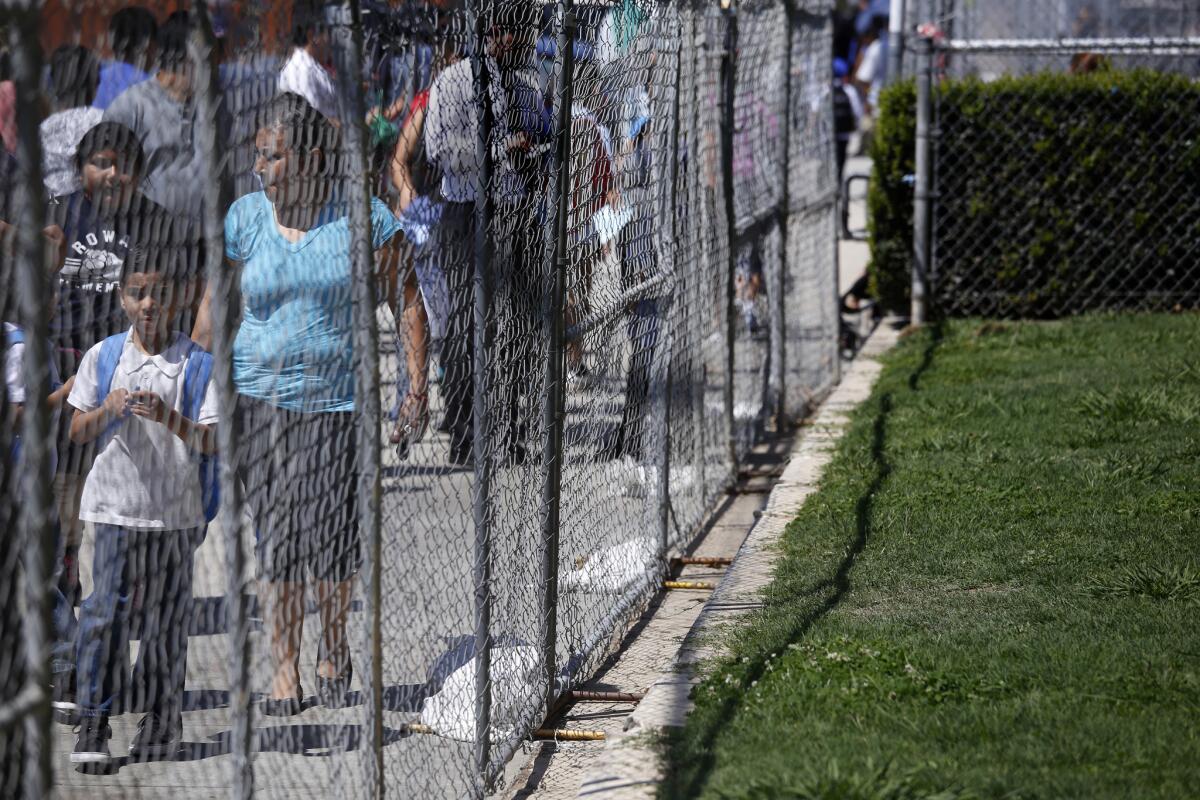Exide cleanup: Lead-contaminated soil to be removed from 2 L.A. schools, district says

- Share via
Amid an outcry from parents over lead contamination, Los Angeles school officials said Monday that they will remove soil with elevated levels of the brain-damaging metal from two elementary schools near the closed Exide Technologies battery recycling plant.
Soil will be replaced in a front lawn and around a tree at Lorena Street Elementary in Boyle Heights and in a front lawn and around two trees at Rowan Avenue Elementary in East Los Angeles, said Robert Laughton, director of environmental health and safety for the L.A. Unified School District.
The move comes more than a year after soil tests in July 2015 found elevated lead levels at schools in southeast areas of L.A. County. The testing was ordered by the California Department of Toxic Substances Control as part of the massive effort to find and remove contaminated soil from homes, schools, daycare centers and parks across seven communities near the former recycling plant in Vernon.
The decision to clean parts of two campuses is based on soil tests conducted as recently as two weeks ago. The action came after a flurry of discussions among state regulators, lawmakers and school district officials since the elevated levels found at schools were made public last month.
Last week, students returned to class to find parts of their campuses fenced off to protect them from lead-contaminated soil. But it wasn’t until Thursday -- two days after classes began -- that the school district notified parents by sending fliers and calling them at home.
The school district’s proposal goes beyond state regulators’ recommendations to remove soil only from around two trees. Elsewhere, fencing and grass would be enough to minimize children’s exposure, the state determined late last week.
Lead is a powerful neurotoxin that can lower IQ, reduce academic achievement and cause other developmental and behavioral problems in children, even at low levels.
State regulators have stressed that the lead detected at schools is at relatively low concentrations and that they recommended fencing, soil removal and other measures out of an abundance of caution.
“We’re talking overall very low risk levels and not in children’s play areas,” said Ana Mascareñas, the toxic substances department’s assistant director for environmental justice.
But parents say the areas include lawns where their children play. And some have demanded to know why authorities did not notify them earlier of the elevated levels.
“Parents are scared and they want immediate action,” said Assemblyman Miguel Santiago (D-Los Angeles), whose office has received hundreds of phone calls from concerned residents. “The public should have absolutely known sooner and action should have been taken much sooner and quicker, particularly when it affects little kids’ health.”
Santiago, who met Monday with toxics regulators and school district officials at Lorena Street Elementary, added that “there’s no excuse to stall, stop or delay any action.” He said it has been difficult to get agencies to work quickly to clean the schools because of “bureaucratic red tape.”
Laughton said the school district will draft a soil removal plan that must be approved by state regulators. He expects the cleanup to be completed in the next few months.
Crews tested the soil at two dozen schools within 1.7 miles of the former Exide plant, with the first dozen completed last year by Exide and the remainder in the spring by the state. Toxics regulators have determined no cleanup is required at 20 schools.
The school district last year removed lead-contaminated soil around two trees at Eastman Avenue Elementary in East Los Angeles. State regulators decided earlier this year to do more testing there and at three other campuses that had previously been sampled by Exide.
Last week, the state determined no further action is necessary at two schools: Eastman and Fishburn Avenue Elementary in Maywood.
Regulators believe decades of air pollution from the battery recycler — which was forced to shut down last year — contaminated up to 10,000 properties in Bell, Commerce, East Los Angeles, Huntington Park, Boyle Heights, Maywood and Vernon. So far, the state has set aside more than $180 million for a cleanup that’s expected to take years.
The department is also compiling a list of dozens of childcare centers near Exide, including both licensed facilities and informal home daycares, to test for lead contamination, Mascareñas said.
Authorities are not certain how much of the lead being found at homes and schools may be tied to the plant’s emissions versus other sources, such as old paint or traffic emissions. So they are also sampling for other metals to identify the source of pollution and potentially recover cleanup costs from Exide and other responsible parties.
Twitter: @tonybarboza
More to Read
Sign up for Essential California
The most important California stories and recommendations in your inbox every morning.
You may occasionally receive promotional content from the Los Angeles Times.











